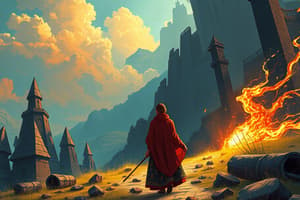Podcast
Questions and Answers
What was the original assumption in literary criticism?
What was the original assumption in literary criticism?
- Meaning resides with the author (correct)
- Meaning resides with the reader
- Meaning resides with the text itself
- Meaning is subjective
What is the primary focus of this unit?
What is the primary focus of this unit?
- To discern the textual meaning of a work
- To relate literary theory to everyday experience (correct)
- To understand the author's intention
- To locate the locus of meaning in a text
What changed in the field of literary theory and criticism over time?
What changed in the field of literary theory and criticism over time?
- The focus shifted from the author to the text (correct)
- The focus shifted from the text to the reader
- The focus remained on the author's intention
- The focus shifted from the reader to the author
What can be achieved by subjecting a work of art to a particular theoretical construct?
What can be achieved by subjecting a work of art to a particular theoretical construct?
What is the purpose of interpretation according to the original assumption?
What is the purpose of interpretation according to the original assumption?
What will this unit enable students to do?
What will this unit enable students to do?
What was the primary focus of literary investigations prior to the 20th century?
What was the primary focus of literary investigations prior to the 20th century?
According to Jide Balogun, what is the history of literary criticism an ally to?
According to Jide Balogun, what is the history of literary criticism an ally to?
What did Terry Eagleton argue that literary theory emerged as a way of doing?
What did Terry Eagleton argue that literary theory emerged as a way of doing?
When did modern literary theory gradually emerge in Europe?
When did modern literary theory gradually emerge in Europe?
What was the 20th century termed by critics and scholars?
What was the 20th century termed by critics and scholars?
What did Terry Eagleton describe as a description of the underlying principles by which we attempt to understand literature?
What did Terry Eagleton describe as a description of the underlying principles by which we attempt to understand literature?
Flashcards are hidden until you start studying
Study Notes
Introduction to Literary Theory and Criticism
- The unit focuses on the rise and development of literary theory and criticism, especially in the 19th and 20th centuries.
- The location of meaning in a text has shifted from the author to the reader over time.
- The purpose of interpretation is to discern the author's intention, which unlocks the textual meaning of the work.
The Nature of Literary Theory and Criticism
- Literary theory and criticism have a long and distinguished history, starting with Plato and Aristotle.
- Prior to the 20th century, literary investigations focused on evaluation, not interpretation.
- The history of literature is the history of literary criticism, with literary theories serving as tools for the realization of literary criticism's crucial obligation.
Emergence of Literary Theory
- Modern literary theory emerged in Europe during the 19th century and gained momentum in the 20th century.
- Terry Eagleton defines theory as the body of ideas and methods used in the practical reading of literature.
- Theories reveal what literature can mean, and all literary interpretation draws on a basis in theory.
Relationship between Literary Theory and Criticism
- Literary theory and criticism emerged during the 19th century and reached greater heights in the 20th century.
- The 20th century is referred to as the age of criticism, with many critical movements emerging, including Marxism, structuralism, formalism, semiology, psychoanalysis, deconstruction, and post-colonial critical studies.
- Notable critics of the 20th century include I.A. Richards, P.R. Leavis, and others.
Studying That Suits You
Use AI to generate personalized quizzes and flashcards to suit your learning preferences.



